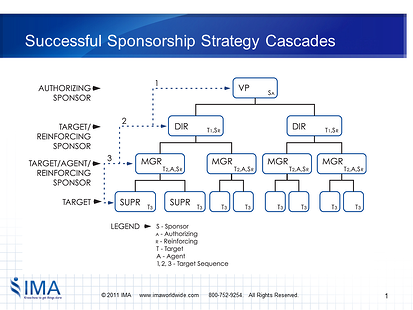One of the biggest aha's from our change management consulting work with leaders of transformational change is that there are certain tasks that only they can carry out. While it may be common practice for these leaders to delegate implementation responsibility, the fact is that there are six essential tasks that can't be delegated to Change Agents. 
Remember that when we talk about the role of these leaders as Sponsors of organizational change, we are assuming a different type of Sponsorship than what occurs in most organizations today. In our change management consulting, Sponsorship is considered a very "active condition" that is based on both action and position. Depending on where the Sponsor sits in the organizational hierarchy determines whether he or she is going to be a "Reinforcing Sponsor." It's not a case of raising your hand and volunteering your support!
The Six Tasks
These six tasks revolve around the need for Sponsors to be actively engaged throughout the entire project lifecycle. As an aside, while we are looking to measure the engagement of employees, it would be more helpful for us to have engaged Sponsors first! This is the single most important factor in ensuring that organizational changes get implemented to full value realization at a faster pace.
Task Number 1: Establish and communicate the Business Case for Action
The Business Case for Action is the change management methodology deliverable that summarizes the critical elements of the definition of the change into an "elevator speech" that is communicated for each Target group. This Business Case for Action is not a static document that is created by communication specialists, never to be changed.
The Business Case for Action has to be translated by each Sponsor for his or her direct reports into a meaningful description of the change for that group.What's "meaningful"? The Business Case for Action only has real meaning if it answers these questions:
- What is changing for me?
- What is in it for me?
- What will happen to me if we don't make this change?
This translation must be handled by the Sponsor with his/her direct reports.
Task Number 2: Participate in Goal Setting
Sponsors can't look to Change Agents to establish individual performer goals-- in other words, to translate the human objectives of the change for each individual performer. This is an essential task that must occur between leaders and their direct reports.
Task Number 3: Allocate Resources
Only Sponsors have the power and authority to allocate resources for implementing the change.
Task Number 4: Concentrate Their Energies on Their Direct Reports by Starting and/or Continuing Cascading Sponsorship 
When we speak of Sponsorship we are talking about the "cascade" of demonstrated commitment that must be built level by level. This means that each Sponsor must demonstrate that commitment to the transformational change by what he says, what he does, and what he reinforces with his direct reports. When this happens in each business unit, at each level of the organization, implementation and adoption occur at a much faster rate of speed.
This "demonstration of commitment" is not a check the box activity that can be delegated to a Change Agent!
Task Number 5: Align and Apply the Reward and Recognition Systems for Their Direct Reports
Change Agents, no matter how effective, do not have the positional authority to apply reinforcements with Targets. Again, this is an essential component of the manager/employee relationship.
Of course, if you haven't defined what the new behaviors are or the performance expectations are in the context of the transformational (or any) change you are implementing, the Sponsor can't provide the reinforcements and rewards that are so powerful in getting changes adopted and sustained! Do you see how these tasks are inter-dependent?
Task Number 6: Monitor Progress Constantly
Engaged Sponsors must be watching continuously to see how Targets are adopting the new behaviors and whether they are meeting the new performance expectations. The most important role of the Sponsor is to express, model, and reinforce their personal commitment to the change. This doesn't just happen once-- it's what the Sponsor does on a daily basis that makes a difference. Again, this is outside of the power and authority of Change Agents!
Too often, our Sponsors aren't clear about what their personal role is. They think that implementation is the responsibility of Change Agents, and they can sit back and just assume it is happening out there. No change management methodology or change management consulting can take the place of quality Sponsorship.
The good news: if your organization gets this right, you are well on your way to full value realization for your changes.


